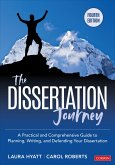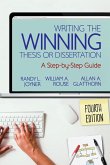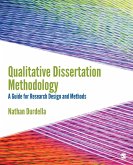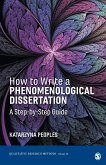- Broschiertes Buch
- Merkliste
- Auf die Merkliste
- Bewerten Bewerten
- Teilen
- Produkt teilen
- Produkterinnerung
- Produkterinnerung
This Second Edition provides a clear roadmap to the complexity of action research whilst explaining how action research is defined, its traditions and history, and the rationale for using it.
Andere Kunden interessierten sich auch für
![Surviving Your Dissertation Surviving Your Dissertation]() Kjell Erik RudestamSurviving Your Dissertation105,99 €
Kjell Erik RudestamSurviving Your Dissertation105,99 €![Writing Your Doctoral Dissertation or Thesis Faster Writing Your Doctoral Dissertation or Thesis Faster]() E. Alana JamesWriting Your Doctoral Dissertation or Thesis Faster74,99 €
E. Alana JamesWriting Your Doctoral Dissertation or Thesis Faster74,99 €![How to Design, Write, and Present a Successful Dissertation Proposal How to Design, Write, and Present a Successful Dissertation Proposal]() Elizabeth A. WentzHow to Design, Write, and Present a Successful Dissertation Proposal73,99 €
Elizabeth A. WentzHow to Design, Write, and Present a Successful Dissertation Proposal73,99 €![The Dissertation Journey The Dissertation Journey]() Laura HyattThe Dissertation Journey41,99 €
Laura HyattThe Dissertation Journey41,99 €![Writing the Winning Thesis or Dissertation Writing the Winning Thesis or Dissertation]() Randy L. JoynerWriting the Winning Thesis or Dissertation49,99 €
Randy L. JoynerWriting the Winning Thesis or Dissertation49,99 €![Qualitative Dissertation Methodology Qualitative Dissertation Methodology]() Nathan Richard DurdellaQualitative Dissertation Methodology106,99 €
Nathan Richard DurdellaQualitative Dissertation Methodology106,99 €![How to Write a Phenomenological Dissertation How to Write a Phenomenological Dissertation]() Katarzyna Peoples (USA Walden University)How to Write a Phenomenological Dissertation48,99 €
Katarzyna Peoples (USA Walden University)How to Write a Phenomenological Dissertation48,99 €-
-
-
This Second Edition provides a clear roadmap to the complexity of action research whilst explaining how action research is defined, its traditions and history, and the rationale for using it.
Hinweis: Dieser Artikel kann nur an eine deutsche Lieferadresse ausgeliefert werden.
Hinweis: Dieser Artikel kann nur an eine deutsche Lieferadresse ausgeliefert werden.
Produktdetails
- Produktdetails
- Verlag: SAGE Publications Inc
- 2 Revised edition
- Seitenzahl: 216
- Erscheinungstermin: 15. Mai 2014
- Englisch
- Abmessung: 229mm x 152mm x 12mm
- Gewicht: 304g
- ISBN-13: 9781483333106
- ISBN-10: 1483333108
- Artikelnr.: 40037942
- Herstellerkennzeichnung
- Libri GmbH
- Europaallee 1
- 36244 Bad Hersfeld
- gpsr@libri.de
- Verlag: SAGE Publications Inc
- 2 Revised edition
- Seitenzahl: 216
- Erscheinungstermin: 15. Mai 2014
- Englisch
- Abmessung: 229mm x 152mm x 12mm
- Gewicht: 304g
- ISBN-13: 9781483333106
- ISBN-10: 1483333108
- Artikelnr.: 40037942
- Herstellerkennzeichnung
- Libri GmbH
- Europaallee 1
- 36244 Bad Hersfeld
- gpsr@libri.de
Kathryn G. Herr is a faculty member in the College of Education and Human Services at Montclair State University in Montclair, New Jersey. She is co-author of the book Studying Your Own School: An Educator's Guide to Qualitative Practitioner Research (Thousand Oaks, CA: Corwin Press, 1994). She is also Editor of the interdisciplinary journal Youth and Society. Her professional background is in Social Work and Education.
Foreword
Preface
Acknowledgments
About the Authors
1. Introduction: What Is an Action Research Dissertation?
The Many Faces of Action Research
Toward a Definition of Action Research
The Action Research Dissertation
2. Action Research Traditions and Knowledge Interests
The Multiple Traditions of Action Research
Action Research and Organizational Development/Learning
Action Science
Participatory Research: The Legacy of Paulo Freire
Participatory Evaluation
Action Research and Community Psychology
Action Research in Education
The Teacher-as-Researcher Movement in Britain
The Practitioner Research Movement in North America
The Danger of Co-Optation
Participatory Action Research with Youth: YPAR
Action Research as Narrative: Self-Study and Autoethnography
Arts-Based Approaches to Action Research
Feminist, Post-Colonial, and Antiracist Approaches to Action Research
The Knowledge Interests of Action Research
Notes
3. The Continuum of Positionality in Action Research
Insider: Researcher Studies Own Self/Practice
Insider in Collaboration With Other Insiders
Insider(s) in Collaboration With Outsider(s)
PAR: Reciprocal Collaboration (Insider-Outsider Teams)
PAR: Outsider(s) in Collaboration With Insider(s)
Outsider(s) Studies Insider(s)
Multiple Positionalities
The Outsider-Within Stance as a Flawed Approach to Action Research
Conclusion
Note
4. Quality Criteria for Action Research: An Ongoing Conversation
Delegitimizing Action Research: Opposition in the Academy
Redefining Rigor: Criteria of Quality for Action Research
Reason and Bradbury's Discussion of Validity and Choice Points
Addressing Bias in Action Research
Are the Findings of Action Research Generalizable?
The Politics of Action Research
Institutional Micropolitics
The Politics of Redefining Professionalism
The Politics of Knowledge
The Macropolitics of Action Research Projects
Note
5. Designing the Plane While Flying it: Proposing and Doing the
Dissertation
Possibilities of a Pilot Study
The Dissertation Proposal
Introducing the Proposed Inquiry
Situating the Study in Relevant Literature
Methodological Considerations
Data Analysis and Representation
Where Do Action Research Questions Come From?
Insider Action Research
Outsider Action Research
Issues of Design and Methodology
Designing Insider Action Research
Designing Outsider Action Research
The Literature Review: Literature in Dialogue With the Data
Writing the Dissertation
Defending the Dissertation
6. What Does an Action Research Dissertation Look Like?
Lynne Mock: Carving a Dissertation Out of a PAR Project
The Entry Process
Creating Participatory Structures
Writing the Dissertation
Emphasizing the Strengths of Action Research
Researcher-Initiated PAR Studies
Initiating the PAR Study
The Emergent Design of the PAR Process
Collaborative Data Analysis
Disseminating the Results: Multiple Forms of Representation and Audiences
John Mark Dyke: Insider Action Research
First Phase of the Work
Iterative Cycles of Inquiry
The Dissertation Research
Gary W. Street: A Principal Cultivating Action Research
Conclusion
Note
7. Ethical Considerations and Action Research
Working with Institutional Review Process
Ethics in Practice
Authentic Collaboration
Learning to Be Researchers
Who's the Writing For?
Moving Beyond Do No Harm
8. Final Thoughts
References
Index
Preface
Acknowledgments
About the Authors
1. Introduction: What Is an Action Research Dissertation?
The Many Faces of Action Research
Toward a Definition of Action Research
The Action Research Dissertation
2. Action Research Traditions and Knowledge Interests
The Multiple Traditions of Action Research
Action Research and Organizational Development/Learning
Action Science
Participatory Research: The Legacy of Paulo Freire
Participatory Evaluation
Action Research and Community Psychology
Action Research in Education
The Teacher-as-Researcher Movement in Britain
The Practitioner Research Movement in North America
The Danger of Co-Optation
Participatory Action Research with Youth: YPAR
Action Research as Narrative: Self-Study and Autoethnography
Arts-Based Approaches to Action Research
Feminist, Post-Colonial, and Antiracist Approaches to Action Research
The Knowledge Interests of Action Research
Notes
3. The Continuum of Positionality in Action Research
Insider: Researcher Studies Own Self/Practice
Insider in Collaboration With Other Insiders
Insider(s) in Collaboration With Outsider(s)
PAR: Reciprocal Collaboration (Insider-Outsider Teams)
PAR: Outsider(s) in Collaboration With Insider(s)
Outsider(s) Studies Insider(s)
Multiple Positionalities
The Outsider-Within Stance as a Flawed Approach to Action Research
Conclusion
Note
4. Quality Criteria for Action Research: An Ongoing Conversation
Delegitimizing Action Research: Opposition in the Academy
Redefining Rigor: Criteria of Quality for Action Research
Reason and Bradbury's Discussion of Validity and Choice Points
Addressing Bias in Action Research
Are the Findings of Action Research Generalizable?
The Politics of Action Research
Institutional Micropolitics
The Politics of Redefining Professionalism
The Politics of Knowledge
The Macropolitics of Action Research Projects
Note
5. Designing the Plane While Flying it: Proposing and Doing the
Dissertation
Possibilities of a Pilot Study
The Dissertation Proposal
Introducing the Proposed Inquiry
Situating the Study in Relevant Literature
Methodological Considerations
Data Analysis and Representation
Where Do Action Research Questions Come From?
Insider Action Research
Outsider Action Research
Issues of Design and Methodology
Designing Insider Action Research
Designing Outsider Action Research
The Literature Review: Literature in Dialogue With the Data
Writing the Dissertation
Defending the Dissertation
6. What Does an Action Research Dissertation Look Like?
Lynne Mock: Carving a Dissertation Out of a PAR Project
The Entry Process
Creating Participatory Structures
Writing the Dissertation
Emphasizing the Strengths of Action Research
Researcher-Initiated PAR Studies
Initiating the PAR Study
The Emergent Design of the PAR Process
Collaborative Data Analysis
Disseminating the Results: Multiple Forms of Representation and Audiences
John Mark Dyke: Insider Action Research
First Phase of the Work
Iterative Cycles of Inquiry
The Dissertation Research
Gary W. Street: A Principal Cultivating Action Research
Conclusion
Note
7. Ethical Considerations and Action Research
Working with Institutional Review Process
Ethics in Practice
Authentic Collaboration
Learning to Be Researchers
Who's the Writing For?
Moving Beyond Do No Harm
8. Final Thoughts
References
Index
Foreword
Preface
Acknowledgments
About the Authors
1. Introduction: What Is an Action Research Dissertation?
The Many Faces of Action Research
Toward a Definition of Action Research
The Action Research Dissertation
2. Action Research Traditions and Knowledge Interests
The Multiple Traditions of Action Research
Action Research and Organizational Development/Learning
Action Science
Participatory Research: The Legacy of Paulo Freire
Participatory Evaluation
Action Research and Community Psychology
Action Research in Education
The Teacher-as-Researcher Movement in Britain
The Practitioner Research Movement in North America
The Danger of Co-Optation
Participatory Action Research with Youth: YPAR
Action Research as Narrative: Self-Study and Autoethnography
Arts-Based Approaches to Action Research
Feminist, Post-Colonial, and Antiracist Approaches to Action Research
The Knowledge Interests of Action Research
Notes
3. The Continuum of Positionality in Action Research
Insider: Researcher Studies Own Self/Practice
Insider in Collaboration With Other Insiders
Insider(s) in Collaboration With Outsider(s)
PAR: Reciprocal Collaboration (Insider-Outsider Teams)
PAR: Outsider(s) in Collaboration With Insider(s)
Outsider(s) Studies Insider(s)
Multiple Positionalities
The Outsider-Within Stance as a Flawed Approach to Action Research
Conclusion
Note
4. Quality Criteria for Action Research: An Ongoing Conversation
Delegitimizing Action Research: Opposition in the Academy
Redefining Rigor: Criteria of Quality for Action Research
Reason and Bradbury's Discussion of Validity and Choice Points
Addressing Bias in Action Research
Are the Findings of Action Research Generalizable?
The Politics of Action Research
Institutional Micropolitics
The Politics of Redefining Professionalism
The Politics of Knowledge
The Macropolitics of Action Research Projects
Note
5. Designing the Plane While Flying it: Proposing and Doing the
Dissertation
Possibilities of a Pilot Study
The Dissertation Proposal
Introducing the Proposed Inquiry
Situating the Study in Relevant Literature
Methodological Considerations
Data Analysis and Representation
Where Do Action Research Questions Come From?
Insider Action Research
Outsider Action Research
Issues of Design and Methodology
Designing Insider Action Research
Designing Outsider Action Research
The Literature Review: Literature in Dialogue With the Data
Writing the Dissertation
Defending the Dissertation
6. What Does an Action Research Dissertation Look Like?
Lynne Mock: Carving a Dissertation Out of a PAR Project
The Entry Process
Creating Participatory Structures
Writing the Dissertation
Emphasizing the Strengths of Action Research
Researcher-Initiated PAR Studies
Initiating the PAR Study
The Emergent Design of the PAR Process
Collaborative Data Analysis
Disseminating the Results: Multiple Forms of Representation and Audiences
John Mark Dyke: Insider Action Research
First Phase of the Work
Iterative Cycles of Inquiry
The Dissertation Research
Gary W. Street: A Principal Cultivating Action Research
Conclusion
Note
7. Ethical Considerations and Action Research
Working with Institutional Review Process
Ethics in Practice
Authentic Collaboration
Learning to Be Researchers
Who's the Writing For?
Moving Beyond Do No Harm
8. Final Thoughts
References
Index
Preface
Acknowledgments
About the Authors
1. Introduction: What Is an Action Research Dissertation?
The Many Faces of Action Research
Toward a Definition of Action Research
The Action Research Dissertation
2. Action Research Traditions and Knowledge Interests
The Multiple Traditions of Action Research
Action Research and Organizational Development/Learning
Action Science
Participatory Research: The Legacy of Paulo Freire
Participatory Evaluation
Action Research and Community Psychology
Action Research in Education
The Teacher-as-Researcher Movement in Britain
The Practitioner Research Movement in North America
The Danger of Co-Optation
Participatory Action Research with Youth: YPAR
Action Research as Narrative: Self-Study and Autoethnography
Arts-Based Approaches to Action Research
Feminist, Post-Colonial, and Antiracist Approaches to Action Research
The Knowledge Interests of Action Research
Notes
3. The Continuum of Positionality in Action Research
Insider: Researcher Studies Own Self/Practice
Insider in Collaboration With Other Insiders
Insider(s) in Collaboration With Outsider(s)
PAR: Reciprocal Collaboration (Insider-Outsider Teams)
PAR: Outsider(s) in Collaboration With Insider(s)
Outsider(s) Studies Insider(s)
Multiple Positionalities
The Outsider-Within Stance as a Flawed Approach to Action Research
Conclusion
Note
4. Quality Criteria for Action Research: An Ongoing Conversation
Delegitimizing Action Research: Opposition in the Academy
Redefining Rigor: Criteria of Quality for Action Research
Reason and Bradbury's Discussion of Validity and Choice Points
Addressing Bias in Action Research
Are the Findings of Action Research Generalizable?
The Politics of Action Research
Institutional Micropolitics
The Politics of Redefining Professionalism
The Politics of Knowledge
The Macropolitics of Action Research Projects
Note
5. Designing the Plane While Flying it: Proposing and Doing the
Dissertation
Possibilities of a Pilot Study
The Dissertation Proposal
Introducing the Proposed Inquiry
Situating the Study in Relevant Literature
Methodological Considerations
Data Analysis and Representation
Where Do Action Research Questions Come From?
Insider Action Research
Outsider Action Research
Issues of Design and Methodology
Designing Insider Action Research
Designing Outsider Action Research
The Literature Review: Literature in Dialogue With the Data
Writing the Dissertation
Defending the Dissertation
6. What Does an Action Research Dissertation Look Like?
Lynne Mock: Carving a Dissertation Out of a PAR Project
The Entry Process
Creating Participatory Structures
Writing the Dissertation
Emphasizing the Strengths of Action Research
Researcher-Initiated PAR Studies
Initiating the PAR Study
The Emergent Design of the PAR Process
Collaborative Data Analysis
Disseminating the Results: Multiple Forms of Representation and Audiences
John Mark Dyke: Insider Action Research
First Phase of the Work
Iterative Cycles of Inquiry
The Dissertation Research
Gary W. Street: A Principal Cultivating Action Research
Conclusion
Note
7. Ethical Considerations and Action Research
Working with Institutional Review Process
Ethics in Practice
Authentic Collaboration
Learning to Be Researchers
Who's the Writing For?
Moving Beyond Do No Harm
8. Final Thoughts
References
Index








